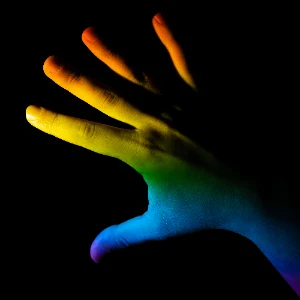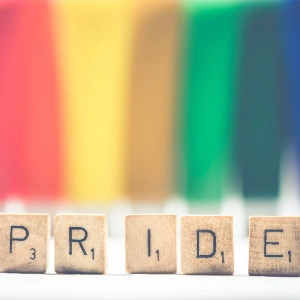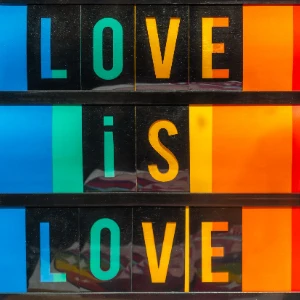Related Links
Neptunic Sexuality - Definition, History, Criticism, and Rapid Rise
Updated on 14th January 2023
Neptunic Sexuality Definition
With the ever-evolving terrain of gender identity, it can be hard to keep up with the multifaceted nature of this phenomenon. Over the previous years, new sexual orientations and gender identities have emerged in the LGBTQ+
culture, with many finding themselves underrepresented in the community. Therefore, before we start to explain what Neptunic Sexuality is, it's essential to know what non-binary people are.
Non-binary people belong to a gender identity that is not solely male or female; therefore, the term non-binary (binary meaning two). Put in simple terms, non-binary people do not think of themselves as exclusively male or solely
female. However, as a group, they vary in gender expressions and, in some cases, may reject them altogether. Non-binary people may identify with a gender (gender expression) in the following ways:

1. Intermediate or separate gender (Neither entirely male-aligned nor female-aligned)
2. Pangender - identify with more than one gender, or multiple gender identities (Both male and female aligned at the same time)
3. Agender - Identify with no gender (Not aligned towards male or female identity)
4. Genderfluid - Fluctuating gender identity (The male or female identity may change).
The sexual orientation of a person is different from the gender identity, and non-binary people have various sexual orientations. The one we will discuss here has been getting a lot of attention recently and is called Neptunic
Sexuality.
History, Meaning, and Neptunic Flag
A person with Neptunic Sexuality is essentially attracted to both non-binary and female genders. This can also be described as being attracted to all genders except the male gender or any male-aligned nonbinary people (remember,
non-binary people can be male or female-aligned). But before we get into the details of what Neptunic Sexuality is and how it emerged into mainstream culture, let's first dive into the meaning behind the word Neptunic.
Neptunic, as we know, stems from one of the planets in our Solar System by name of Neptune. Neptune is derived from the ancient Roman conception of the sea of God, otherwise known as Poseidon. We see traces of this association
within the Neptunic Flag, essentially a basic representation of Neptune with a progression of blue and purple hues. The Neptunic flag, representing all who identify with Neptunic Sexuality, was created by a Twitter user called
'strewbryfemme' on July 4th and is now used worldwide for Neptunics.
In Astrology, Neptune symbolizes the ideals of compassion, empathy, and dreams, with those who possess a Neptunic personality considered sweet and forgiving. When we think back to the definition of Neptunic Sexuality, we see
strong overlaps with this concept as individuals possessing this sexual orientation embrace a wide range of gender identities and sexualities. The official title was created on the internet on Tumblr, where a user found the term
many now Neptunic Sexual people resonate with.

How Do People With Neptunic Sexuality Identify Themselves?
First, it is important to note that Neptunic Sexuality cannot be identified by observing one's appearance, behavior, or physical expressions. As with all gender identities, we cannot use these traits to inform ourselves about how
someone identifies. These are deeply rooted attributes that stem from one's upbringing and personality, where it is crucial to be prudent when attempting to attribute a gender to an individual. In these cases, it is polite to ask
and see what gender they identify with primarily.

Criticism of Neptunic Sexuality and Lesbianism
One major criticism Neptunic Sexuality has received is how it greatly resembles
lesbian sexual orientation. Remember that Neptunic Sexuality refers to the attraction towards female-oriented genders while having no attraction to men or male-based genders. Pundits have argued that this implies the Neptunics are
essentially Lesbian – But this is not the case.
There is a straightforward distinction that Neptunics have put forth, which differentiates their sexual orientation from that of Lesbians. To be a Lesbian, one needs to identify
as a female-based gender and not a male-based gender, as being Lesbian requires both partners to have a femme-based gender identification. However, this does not apply to Neptunics, as one does not need to be femme-gender orientated
to be Neptunic, as they can be gender fluid or non-binary while only being attracted to femme-based genders. And this is not all – According to Neptunics, you can be both Lesbian and Neptunic if that corresponds with your gender
identity, meaning that both categories are not mutually exclusive.
The Ongoing Debate on Neptunic Sexuality and Gender
Neptunic Sexuality has sparked many debates in online forums, with many taking a stance against
it. One portion of the arguments come from honest positions of individuals seeking to understand this novel gender better. Yet, for a few, this has sparked outrage as they believe that Neptunic Sexuality means that identification
via one's sex rather than gender is making a comeback.
For example, multiple Reddit threads state that since Neptunics are attracted to non-binary individuals of the same sex, this implies that their attraction is also based
on biological sex and not only gender, which can be fluid. The main argument of the faction is that they do not wish for non-inclusive sex identification to return into the fold, as this is apparently what Neptunic Sexuality
implies.
Neptunic Sexuality Through a Psychological Lens
This new movement of gender inclusivity can be viewed through various psychological lenses. It is innately human to possess a sense of belonging to a group or a tribe, as alienation typically meant death in the early days of human
evolution. This phenomenon that has exploded over the past decade demonstrates how many individuals in today's society felt generally excluded from the rest of the group.
Research into social psychology has shown that many individuals no longer identify with the binary male/female dichotomy and become highly oppressed due to this limiting paradigm. They felt an innate difference in themselves and
sought new avenues for gender expression. This was one of the primary roles of forming the LGBTQ+ community that gave these individuals a voice and an avenue for expression that they did not previously possess.
The concept of gender itself is a social construct, and there is no inherent biological basis for discrimination based on gender. Therefore, promoting gender inclusion is a way of acknowledging and valuing all individuals' intrinsic
worth and dignity, regardless of their gender identity. This can foster a more inclusive and equitable society, which can positively impact the well-being of individuals and communities.

The Rapid Rise of Neptunic Sexuality
When we bring this back to the topic of
Neptunic Sexuality and how rapidly its community grew over the past few years, we begin to realize how many people lacked a sense of belonging and adequate representation for their gender identity. It is difficult to predict
exactly how things will unfold over time, as many social, cultural, and political factors come into play, but one thing is sure – That these communities will continue to advocate for greater acceptance, inclusion, and equality
for all individuals, regardless of their sexual orientation or gender identity.
Creating a Fairer World - Neptunic Sexuality
It is also possible that the LGBTQ+ community will continue to push for legal protections and rights, such as equal access to employment, housing, and public accommodations, as well as recognition of same-sex relationships and
parenting rights.

Although Neptunic Sexuality has received some criticism due to how it brings back biological sex identification, the overarching theme of inclusivity means that healthy debates are taking place to ensure that everyone has a place
in the community. For many uninformed on the topic, these new waves of gender identification will seem foreign or bizarre; however, all novel phenomena follow the same patterns, and with consistent de-stigmatization, we must bring
awareness to how these marginalized individuals feel. From this, we can create a fair and equal world for all to feel safe and comfortable expressing themselves freely.
